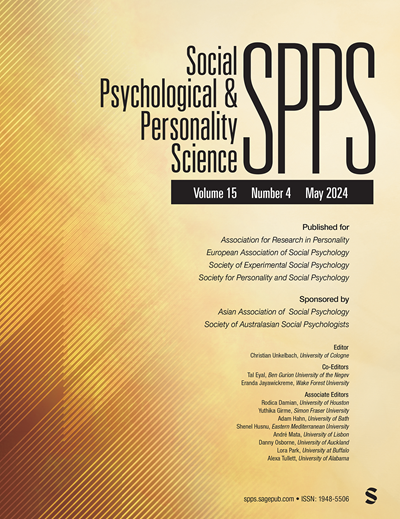No Evidence for Transactional Effects Between Religiosity and Self-Esteem in a Secular Country
IF 3.3
2区 心理学
Q1 PSYCHOLOGY, SOCIAL
引用次数: 1
Abstract
This research tests the unique predictions of three different theoretical perspectives on the self-esteem benefits of religiosity: the religiosity-as-a-personal-relationship-with-a-higher-power perspective, the religiosity-as-a-resource perspective, and the religiosity-as-social-value perspective. To do so, we used random-intercept cross-lagged panel models and examined the between- and within-person associations between three indicators of religiosity (belief in God, service attendance, and prayer frequency) and self-esteem across 11 annual assessments in a nationally representative sample of Dutch individuals ( N = 12,915). The results reveal largely nonsignificant associations between all three religiosity indicators and self-esteem at the between- and the within-person levels. This finding supports the religiosity-as-a-social-value perspective, suggesting that the self-esteem benefits of religiosity are restricted to religious cultures only. This research extends previous research by showing that the results hold across different measures of religiosity and by providing some initial evidence that the power of the religiosity-as-a-social-value perspective might be larger than formerly assumed.世俗国家中宗教信仰与自尊之间的交易效应无证据
本研究检验了三种不同的理论视角对宗教信仰对自尊益处的独特预测:宗教信仰作为一种与更高权力的个人关系视角、宗教信仰作为一种资源视角和宗教信仰作为一种社会价值视角。为此,我们使用随机截距交叉滞后面板模型,并在11次年度评估中检验了宗教虔诚度(对上帝的信仰、参加礼拜的次数和祈祷频率)和自尊之间的人与人之间和人与人之间的联系,这些评估是在荷兰个人(N = 12,915)的全国代表性样本中进行的。结果显示,在人际和人际层面上,所有三个宗教信仰指标与自尊之间的联系基本上不显著。这一发现支持了宗教信仰作为一种社会价值的观点,表明宗教信仰对自尊的好处仅限于宗教文化。这项研究扩展了之前的研究,表明结果适用于不同的宗教虔诚度衡量标准,并提供了一些初步证据,表明宗教作为一种社会价值视角的力量可能比以前假设的要大。
本文章由计算机程序翻译,如有差异,请以英文原文为准。
求助全文
约1分钟内获得全文
求助全文
来源期刊

Social Psychological and Personality Science
PSYCHOLOGY, SOCIAL-
CiteScore
12.50
自引率
1.80%
发文量
77
期刊介绍:
Social Psychological and Personality Science (SPPS) is a distinctive journal in the fields of social and personality psychology that focuses on publishing brief empirical study reports, typically limited to 5000 words. The journal's mission is to disseminate research that significantly contributes to the advancement of social psychological and personality science. It welcomes submissions that introduce new theories, present empirical data, propose innovative methods, or offer a combination of these elements. SPPS also places a high value on replication studies, giving them serious consideration regardless of whether they confirm or challenge the original findings, with a particular emphasis on replications of studies initially published in SPPS. The journal is committed to a rapid review and publication process, ensuring that research can swiftly enter the scientific discourse and become an integral part of ongoing academic conversations.
 求助内容:
求助内容: 应助结果提醒方式:
应助结果提醒方式:


